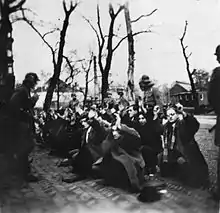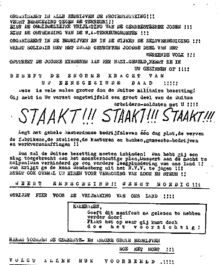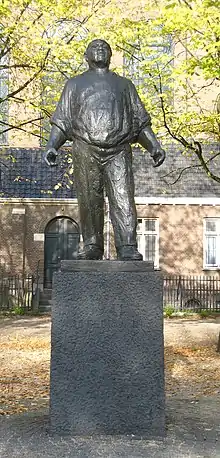February strike
The February Strike (Dutch: Februaristaking) was a general strike in the German-occupied Netherlands in 1941, during World War II, organized by the then-outlawed Communist Party of the Netherlands in defence of persecuted Dutch Jews and against the anti-Jewish measures and activities of the Nazis in general.


The direct causes were a series of arrests and pogroms held by the Germans in the Jewish neighbourhood of Amsterdam, the Jodenbuurt. It started on 25 February 1941 and lasted for two days; on 26 February, 300,000 people joined the strike. The strike was harshly suppressed by the Germans after three days.[1]
The 1941 February Strike is considered to be the first public protest against the Nazis in occupied Europe,[2] and the only mass protest against the deportation of Jews to be organized by non-Jews.[3]
Background
The Netherlands surrendered to Nazi Germany in May 1940, and the first anti-Jewish measures (the barring of Jews from the air-raid defence services) began in June 1940. These culminated in November 1940 in the removal of all Jews from public positions, including universities, which led directly to student protests in Leiden and elsewhere. At the same time, there was an increasing feeling of unrest amongst workers in Amsterdam, especially the workers at the shipyards in Amsterdam-Noord, who were threatened with forced labour in Germany.
Cause
As tensions rose, the Dutch pro-Nazi movement NSB and its streetfighting arm, the WA ("Weerbaarheidsafdeling" - defence section), were involved in a series of provocations in Jewish neighbourhoods in Amsterdam. This eventually led to a series of street battles between the WA and Jewish self-defence groups and their supporters, culminating in a pitched battle on 11 February 1941 on the Waterlooplein in which WA member Hendrik Koot was badly wounded. He died of his injuries on 14 February 1941.
On 12 February 1941, German soldiers, assisted by Dutch police, encircled the old Jewish neighbourhood and cordoned it off from the rest of the city by putting up barbed wire, opening bridges and putting in police checkpoints. This neighbourhood was now forbidden for non-Jews.
On 19 February, the German Grüne Polizei stormed into the Koco ice-cream salon in the Van Woustraat. In the fight that ensued, several police officers were wounded. Revenge for this and other fights came in the weekend of 22–23 February, when a large-scale pogrom was undertaken by the Germans. 425 Jewish men of age 20–35 were taken hostage and imprisoned in Kamp Schoorl and eventually sent to the Buchenwald and Mauthausen concentration camps, where most of them died within the year. Of 425, only two survived.
The strike

Following this pogrom, on 24 February, an open-air meeting was held on the Noordermarkt to organise a strike to protest against the pogrom as well as the forced labour in Germany. The Communist Party of the Netherlands, made illegal by the Germans, printed and spread a call to strike throughout the city the next morning. The first to strike were the city's tram drivers, followed by other city services as well as companies like De Bijenkorf and schools. Eventually 300,000 people joined in the strike, bringing much of the city to a halt and catching the Germans by surprise.[4] Though the Germans immediately took measures to suppress the strike, which had grown spontaneously as other workers followed the example of the tram drivers, it still spread to other areas, including Zaanstad, Kennemerland in the west, Bussum, Hilversum and Utrecht in the east and the south.[5] The strike did not last long. By 27 February, much of it had been suppressed by the German police. Although ultimately unsuccessful, it was significant in that it was the first and only direct action against the Nazis' treatment of Jews in Europe.
The next strike would be student strikes in November 1941, and after that the large April–May strikes in 1943 that ushered in a period of armed covert resistance on a national scale.
In the rest of Nazi-occupied Europe the Greeks in April 1942,[6] the Danes starting in the summer of 1943, the Luxemburgers in August 1942, the Belgians in May 1941, the Norwegians in September 1941 and the North French miners in May–June 1941 also went on strike, but not as early as the Dutch strike of February 1941 and it has to be noted that the February strike in Amsterdam was the only strike against the way Jews were treated by the Germans in Nazi-occupied Europe.
Historiography
The book De februaristaking ("The February strike") by historian Ben Sijes was published in 1954.
Remembrance

The strike is remembered each year on 25 February, with a march past the De Dokwerker, the memorial made for the strike in 1951 and first unveiled in December 1952. This statue was made by Dutch sculptor Mari Andriessen. All political parties, as well as the city public transport authorities and organisations of Holocaust survivors, participate in the remembrance. Although three communist organizers were shot to death after the strike and 12 communist organizers were sent to jails in Germany, during the Cold War the communists were forced to remember the strike separately from other political groups. For many years after the war, Dutch officials publicly denied contributions by the communists to the strike.
Bibliography
- Jong, Dr. L. de (1985) [1966]. De Bezetting (in Dutch) (3rd ed.). Amsterdam: Querido. pp. 135–178. ISBN 90-214-6898-0.
- Sijes, Dr. B. A. (1978) [1954]. De Februaristaking (in Dutch). © Dutch Institute for War Documentation. Amsterdam: H. J. W. Becht. ISBN 90-230-0290-3.
- Presser, Dr. J. (December 1965) [1965]. Ondergang (6th ed.). The Hague: Staatsuitgeverij. ISBN 90-12-04893-1.
- Manheim, Jack. Memoirs of the Dutch Underground 1940 - 1945 - Why me? (England, UK: Amazon, 2017). ISBN 1521902240
See also
- Strike of the 100,000: communist-led strike against the Nazi occupation in Belgium, May 1941
- Milk Strike: Norwegian strike in September 1941
- 1942 Luxembourgish general strike, 31 August 1942
References
- Amsterdam, USHMM
- 1941: The Dutch Strike Against Nazi Abuses of Jews, Haaretz
- Amsterdam marks anniversary of 1941 mass strike in support of Jews, World Jewish Congress
- Congress, World Jewish. "Amsterdam marks anniversary of 1941 mass strike in support of Jews".
- de Jong, Dr. Loe. Het Koninkrijk der Nederlanden in de Tweede Wereldoorlog. RIOD, part 4, first half, Amsterdam, 1971.
- Mazower (2001), p.112
External links
![]() Media related to February strike at Wikimedia Commons
Media related to February strike at Wikimedia Commons
- North French miners' strike, May-June 1941
- Audio collection February strike at the International Institute of Social History
- Nizzan Zvi Cohen, “They’re taking our Jews!”: How Amsterdam’s workers protested the deportation of Dutch Jews, at Davar, 21 April 2020.